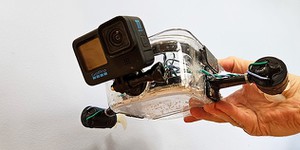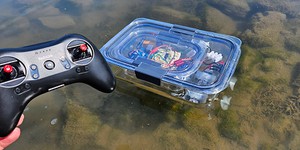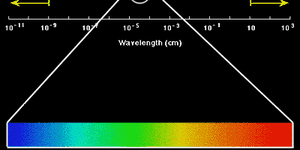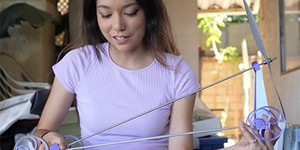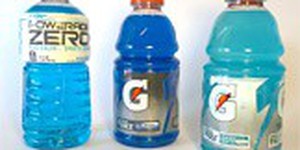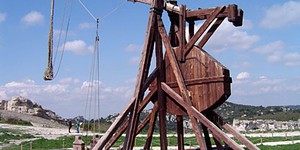Eleventh Grade Science Projects (175 results)
Science Buddies' eleventh grade science projects are the perfect way for eleventh grade students to have fun exploring science, technology, engineering, and math (STEM). Our eleventh grade projects are written and tested by scientists and are specifically created for use by students in the eleventh grade. Students can choose to follow the science experiment as written or put their own spin on the project.
For a personalized list of science projects, eleventh graders can use the Science Buddies Topic Selection Wizard. The wizard asks students to respond to a series of simple statements and then uses their answers to recommend age-appropriate projects that fit their interests.
Let us help you find a science project that fits your interests, with our Topic Selection Wizard.|
Select a resource
Sort by
|
Have you ever wanted to explore cold or murky water? What about places where it could be dangerous or difficult for humans to swim? Remotely operated vehicles (ROVs) allow humans to take pictures, videos, and scientific samples of underwater life and habitats while safely operating the vehicle from a boat or from shore. In this project you will design and build your own small ROV that you can test in a bathtub, pool, or nearby body of water.
Read more
Featured
Have you heard that garlic powder is supposed to inhibit the growth of bacteria? Which do you think would make a better disinfectant: a solution of garlic powder or a solution of bleach? This project shows you a straightforward way to compare the effectiveness of different disinfectants (or other antimicrobial agents), by measuring zones of inhibition on a culture plate.
Read more
Maple syrup on pancakes, ripe bananas, and soft drinks are all foods that are tasty to us
because of the sugar in them. But did you know there are different kinds of
sugar? One food can have multiple kinds of sugar in it, and our bodies actually process
the different types of sugars differently. In this science project, you will measure the
concentration of two sugars—glucose and sucrose—in different foods, and investigate how
sucrose is converted into glucose with the help…
Read more
Do you like playing with radio-controlled (RC) toys like cars, planes, and boats? What if you could build and customize your own? In this engineering project, you will learn how to build your own RC boat using an Arduino and a plastic food storage container.
Read more
Did you know that you can measure the speed of light using a microwave oven, some egg white, and a ruler? Find out how with this cool kitchen science project thanks to Mr. Nick Hood, a science teacher in Fife, Scotland.
Read more
We use passwords every day for our email and other computer accounts. How secure is the password that you use? How hard would it be for someone to guess your password? How hard is it to write a computer program to guess a password? You can see for yourself by writing a simple password guesser in the computer language Python. We will get you started with some ideas, a little sample code, and a few passwords for your computer program to try and guess.
Read more
The human kidney is the most commonly transplanted organ in the United States, numbering more than 17,000 transplants in 2010 alone! But kidney transplantation technology faces a lot of challenges, including a shortage of kidney donors and the need for recipients to take immunosuppressant drugs to keep their bodies from rejecting a transplanted kidney. In this science project, with the help of bioinformatics databases, you will explore how a kidney could be bioengineered using stem cells,…
Read more
HELP! Locating survivors trapped under rubble is a difficult and dangerous task. After a natural disaster, like an earthquake, rescuers must act quickly to save as many lives as possible. They can use robots with different types of sensors to help find survivors. In this project you will build a sound-tracking robot that can use two microphones to drive toward a sound source. Designing the robot's algorithm will be up to you.
Read more
Is it possible for an entirely wind-powered vehicle to travel directly downwind faster than the wind? This might seem counterintuitive or like it would violate the law of conservation of energy. After all, any good scientist knows that perpetual motion machines are impossible. However, as demonstrated by YouTubers Rick Cavallaro, Derek Muller (Veritasium), and Xyla Foxlin, you can take advantage of some tricky physics to make this vehicle work. Can you build—or even improve—your own…
Read more
Do you read the list of ingredients in foods and drinks before you buy them at the grocery store? If you do, you may have noticed that many of the items, especially colored drinks, contain dyes with names such as FD&C Blue 1, Red 40, or Yellow 5. But how much dye is needed to create all these colors? In this chemistry science project, you will build a simple spectrophotometer that is able to measure the concentration of colored chemicals in solutions. You will test your device by measuring…
Read more
Before cannons widely replaced them, siege engines were often used by armies to throw large stones and other projectiles to break down castle walls. One of the most advanced siege engines used in the Middle Ages was the trebuchet, which used a large counterweight to store energy to launch a payload, or projectile. The horizontal distance the payload would travel is called the trebuchet's range. Figure 1, below, shows a modern reconstruction of a trebuchet.
The range of a trebuchet has…
Read more
|
Explore Our Science Videos
Build A Wall Marble Run!
Crayon Rock Cycle
DIY Mini Propeller Car


